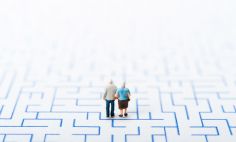Health Topics

Lewy body dementia: What you need to know
The disease affects more than 1 million people in the U.S.
Lewy body dementia (LBD) is one of the most common types of dementia—but also one of the least well-known.
The disease affects more than 1 million people in the U.S. The comedian Robin Williams and All-Star baseball player Bill Buckner had the disease when they died.
Dementia is not a normal part of aging. It can cause memory loss, trouble with everyday tasks, and other cognitive issues that can interfere with your daily life.
What causes LBD?
LBD is a disease associated with abnormal deposits of protein in our brains.
These deposits, called Lewy bodies, affect chemicals in our brains that help control thinking, movement, behavior, and mood.
What are the symptoms?
The most common symptoms of Lewy body dementia include changes in memory, thinking, movement, behavior, and sleep. Symptoms can appear slowly or without warning and will worsen over time.
People with the condition may not have every symptom in the early stage. People who think they or a loved one may have LBD symptoms should try to keep a list of them and share the list with their health care provider.
How is LBD diagnosed?
Diagnosing LBD can be hard, because early symptoms might seem like those of Alzheimer’s disease or a mental illness. Alzheimer's is another type of dementia that causes a decline in memory and thinking skills.
Some people with LBD are first diagnosed with Parkinson’s disease. People with Parkinson’s experience tremors and problems with walking and using their hands.
A doctor can diagnose LBD by discussing symptoms with the patient, family members, or caregivers.
There are also tests that can support an LBD diagnosis:
- An imaging scan, such as a PET scan, can detect changes in a person's brain.
- A heart test called a myocardial scintigraphy can show if there is less activity in a person's heart nerves.
- A sleep study can confirm a sleep behavior disorder linked to LBD.
Treatment
There is no cure for LBD, but medicine, therapy, or both can help with the symptoms.
Some options include:
- Medicines that can help thinking, movement, and mental distress
- Physical therapy to help with movement
- Speech therapy, which may help with swallowing and speaking problems
- Occupational therapy, which can help teach new ways to do everyday activities
- Support groups and talk therapy
- People with LBD may require help in their daily life in the early stage of the disorder
- Caregiver education and support is an important part of the care plan
People with LBD and their families should work with their health care providers for the best treatment path for their lifestyle and symptoms.







